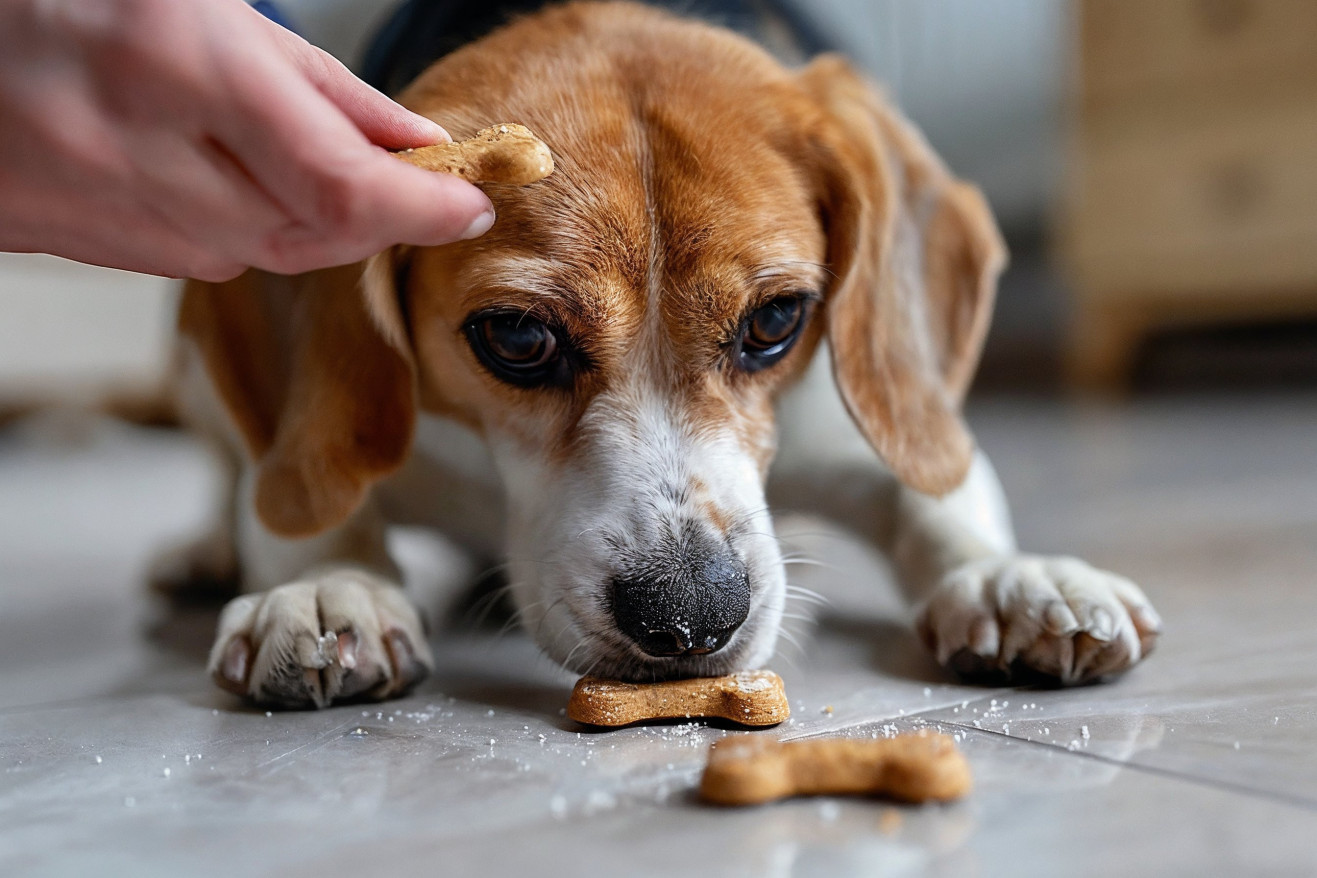Are Milk Bones Bad for Dogs? A Nutritional Analysis
23 March 2024 • Updated 22 March 2024

Milk bones have been a popular dog treat for many years, but in light of their ingredients, many dog owners are wondering if they are actually good for their furry friends. Milk bones are made with a number of ingredients that can be problematic for dogs, including wheat, milk products, added fats, salt, preservatives and artificial colors, all of which can lead to digestive issues and other problems like obesity, allergies and other health issues if they are consumed in large amounts.
To help dog owners better understand the potential drawbacks and benefits of giving milk bones to their dogs, we will review information from veterinary nutritionists, dog health organizations, and studies that have looked at the effects of some of the most common ingredients in milk bones on dogs' digestion, weight and health. This will help dog owners make more informed decisions about whether or not they should continue to give their dogs milk bones or if they should find a healthier alternative that will better promote their dog's health.
Are Milk Bones bad for dogs?
What's In Milk Bones?
Milk bones contain a number of ingredients that pet parents may want to think twice about before giving them to their dogs. Wheat and milk are two of the most common allergens in dogs and can lead to digestive upset and allergic reactions in dogs, especially those with allergies and intolerances. Meanwhile, added fats like beef fat can lead to obesity and other health issues if consumed in large quantities.
The preservative BHA is one of the most controversial ingredients in milk bones. While the FDA has deemed it safe when used in small amounts, some research has shown that BHA may be associated with health concerns including cancer. Meanwhile, artificial colors and flavors in some milk bone products have been associated with health concerns.
As a result, while some veterinarians may sell milk bones in their practices, many pet nutritionists and other animal health experts suggest that pet parents use caution and limit the number of milk bones they give their dogs due to their unhealthy ingredients. This includes feeding them in moderation and watching for adverse reactions.
Moderation and Portion Control: Treating Responsibly
To avoid health problems like obesity and digestive issues, it's important to keep treats to no more than about 10% of a dog's daily caloric intake. Preventive Vet notes that for a 10-pound dog, this would mean about 21 calories from treats per day, which is about 9 Zuke's Mini treats.
The number of treats a dog can have in a day will vary based on the dog's size, age, and activity level, as well as the calorie content of the treats. NutriSource Pet Foods even offers specific numbers, noting that a 60-lb dog should have no more than 100 calories from treats per day, while a 15-lb dog should have no more than 43 calories. This is why it's important to look at the calorie content of treats and do the math to figure out how many treats your dog can have in a day based on their daily caloric needs.
It's also important to keep an eye on your dog's weight and adjust the number of treats you give them accordingly to make sure they stay at a healthy weight and don't develop any health problems related to obesity. The Wildest suggests that you check for signs like being able to feel the ribs, seeing an abdominal tuck, and feeling an indention between the last rib and hips to make sure your dog is at a healthy weight.
Trying Out Natural, Healthier Treats
As a result, many dog owners are looking for healthier, more natural treats for their pets as an alternative to the highly processed milk bones. Treats made from whole food ingredients like peanut butter, oats, carrots, pumpkin, and bananas can be a healthy and cost-effective alternative. Raleigh Vet notes that these treats can be especially beneficial because they allow pet parents to know exactly what their dog is eating and avoid potentially harmful additives like artificial colors, flavors, and preservatives.
Recipes like peanut butter and banana treats or peanut butter and carrot treats can be made at home and provide dogs with essential nutrients. In addition, there are more and more natural dog treat brands that use high-quality, natural ingredients like fruits, vegetables, and lean meats.
However, it's important to remember that when trying out new treats, pet parents should introduce them in moderation and pay attention to their dog's digestive health and overall reaction to the new food, as AllRecipes points out.
Potential Health Risks and Choking Hazards
While milk bones are generally safe for dogs, there are potential risks and hazards that come with any hard, rigid treat. Petzyo notes that hard treats like milk bones, antlers, and bones can be choking hazards and can cause damage to a dog's teeth, mouth, or digestive system if they are not eaten carefully. Rawhide treats and other hard chews can also be a risk for intestinal blockages or obstructions if they are swallowed in large pieces.
The FDA has even gone so far as to issue a series of warnings about the dangers of bone treats for dogs, which have been associated with reports of illnesses, injuries, and even deaths. VCA Animal Hospitals says that bones can lead to broken teeth, injuries to the mouth and tongue, choking, and damage to the stomach and intestinal lining.
Dog owners should be sure to monitor their dogs when they are eating hard treats and should also consider safer options like softer chews or dental-friendly toys, as Preventive Vet points out. By being aware of the potential health risks, dog owners can make choices that will help to keep their pets safe and healthy.
Finding the Right Balance: How to Feed Your Dog Milk Bones Safely
As with any other type of treat, it's important to feed milk bones and other commercial dog treats to your pet in moderation. While milk bones can be a fun, occasional treat for dogs that don't have allergies or sensitivities, it's important to make sure that they're not a regular part of your dog's diet.
In addition to limiting the number of milk bones you give your dog, it's also important to make sure that they're eating a healthy, balanced diet that meets their nutritional needs.
By offering a range of treats, including homemade options and treats made from natural, whole-food ingredients, you can make sure that your dog's treat intake is as balanced as possible. Regular exercise and keeping an eye on your dog's weight and overall health are also important to make sure that even healthy treats don't contribute to obesity or other health problems.
Of course, every dog is different, and it's important to work with your vet to find the right treats and feeding routine for your pet.


